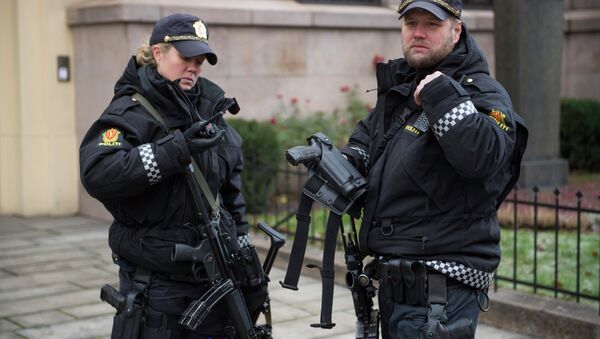On Saturday, Norwegian Progress Party's (FrP) politician Christian Tybring-Gjedde called upon the government to hold a referendum on immigration following Ankara's announcement that it would no longer restrain asylum seekers in its territory from reaching Europe.
According to reports, thousands of refugees have already reached the border of Greece after Ankara kicked off a new military operation in the Syrian province of Idlib in the aftermath of clashes between Turkey-backed jihadist groups and Syrian government forces. The developments in Idlib have raised fears that the EU is facing a new refugee crisis.
It is not the first time that the FRP has cited the necessity of holding a popular vote on immigration. In June 2015, when the EU refugee crisis reached is climax the party voiced the idea while opposing the government's proposal to accommodate thousands of asylum seekers. Norway has not held a nationwide plebiscite since a vote on whether to join the EU in 1994.
As of 2019, Norway's immigrant population amounts to 944,402 people – including both migrants and Norwegians born to immigrant parents – making up 17.7% of the country's total population. This number includes 417,662 migrants who came from Asia, Africa, Latin America, Oceania (except Australia and New Zealand), and Europe (except the EU28/EEA).
Norway's Political Climate is Negative Towards Refugees
Jo Jakobsen, political science and international relations professor at the Norwegian University of Science and Technology, suggests that "the current situation has to be seen in light of the refugee crisis of 2015-2016".
"At the beginning of that crisis, several European countries, Norway included – but in particular Germany, Sweden, the Netherlands, and Austria – were fairly welcoming", Jakobsen says. "But soon, the tone of the debate changed, border checks were implemented, barriers to entry were raised, and the famous EU deal with Turkey on the closing of the 'Balkan route' was implemented".
The apparent change of heart was apparently prompted by the growing rates of migrant-related crimes propelled by the influx of migrants. Thus, a survey by the Norwegian channel TV2 indicated that nearly 70 percent of the crimes, including knife attacks, beatings and other instances of serious abuse, registered in the country's capital between 2018 and 2019 were committed by immigrants. Yet another Scandinavian country, Sweden has seen the upsurge in rape cases and bombing attacks, which for quite a while have remained underreported by the country's mainstream media.
According to the political scientist, FrP's approach is meant "to make it extremely hard for refugees to obtain permanent stay in Norway even if they manage to get here".
"Given that the current political climate in Norway is fairly negative toward non-Western immigration, FrP feels the need to keep their position as the most immigration-sceptical party, by moving even more in that direction. This is so not least because FrP needs to cater to their core constituencies, which fear large-scale immigration. The suggestion for a referendum on this issue must be seen in this context; it has no chance of coming to fruition, but it satisfies a lot of FrP’s voters, who fear a repetition of 2015-2016".
The scholar emphasises that much depends on how the situation will continue to unfold in Idlib and on Turkey’s relations with the Syrian government and Russia. As for Ankara, it is "using Europe’s fear of a new refugee crisis for what it’s worth in a bargaining context", he notes.
Jakobsen foresees that "if Turkey continues on its present path, and if it doesn’t reverse its policy to let refugees move northwards, we can expect a situation in Europe similar to that which commenced in 2016: strong border controls, harsher policies on immigration (some version of FrP’s suggestions), more and harsher anti-immigrant rhetoric, more clashes between migrants and borders police". According to him, if the crisis continues to gain pace the European population will further lean towards the conservatives.
The refugee crisis of 2015 when 1.3 million refugees flooded Europe was followed by a rise of populist and Eurosceptical parties across the EU who often cited the increase in violence and crimes committed by foreign assailants from the Middle East, Africa and Central Asia.




